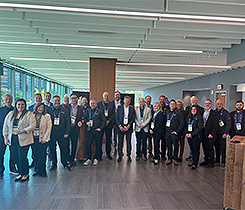A Propane Profile: Mark Rachal
Every Monday LP Gas magazine sends out “Trader’s Corner,” a newsletter written by Mark Rachal detailing propane supply and inventory trends and issues.
When he isn’t writing “Trader’s Corner” Rachal serves a dual role as an analyst and a consultant for Cost Management Solutions (CMS). He keeps track of all of the factors that effect propane prices and advises retailers on when to buy their product.
Rachal watches news wires and reads government and industry reports to makes sure that his retailers can stay informed throughout the day. He also compiles a daily nine-page report, “Propane Price Insider,” that gives detailed analysis and data retailers can use to make informed decisions about when to buy.
In the midst of all this data gathering and advising, the man behind the newsletter took some time to chat with LP Gas managing editor Clara Richter about his experience in the industry, why he feels what he does is important and how a short stint teaching helped him be successful in his current position.
LP Gas: Where have you been in the propane industry?
Rachal: I started in the energy industry, not really the propane industry, but it’s all interconnected. I started at Chevron in production. I then transferred over to a division of Chevron called Warren Petroleum, which is a major distributor of propane. I worked mainly in the Midwest. We marketed off of pipelines in the Northeast, managed supply for refiners and managed sales of propane in the Midwest.
I also worked for a natural gas company that deregulated and started dealing with natural gas processing and then selling the fungible products from the gas processing facilities.
I spent a little time as an 8th grade earth science teacher between the time with the natural gas utility company and when I moved back to Louisiana, which is my home state. I wasn’t really sure what I was going to be doing, but I was always interested in teaching. Earth science really dovetails into our business quite well.
LP Gas: Has your teaching experienced helped you in your current role?
Rachal: I am kind of a teacher at heart, which helps me a lot because we are about education. The concepts of financial hedging are new to our industry, especially on the retail level. Many of the big players, the major natural gas utilities, electric companies, crude companies, they use these tools to their advantage and it wasn’t something that was available to propane retailers. So we started out really informing our customers, but we realized they needed a path they could act upon.
We came up with a process for them to understand what a swap was and how they could use it to manage risk, what an option was and how they could use it to manage risk. We started having seminars around the country to help them learn how to use these tools.
Propane retailers are mostly family run businesses. These men and women have inherited these companies through the generations and now these folks are taking control and there is a tremendous amount of pressure on them not to lose [the business]. To keep the history of that company going they need these tools to be able to function and make sure they aren’t taking undue risk.
LP Gas: Why do you feel what you do is important to the industry?
Rachal: Our primary product is information. By design, we do not provide physical supply or wet barrels to the retailers. We believe that is the best way for us to remain unbiased in our view of the propane market. When Dale Delay founded CMS he felt that propane retailers were too often making major supply decisions with very little information. I agreed. My primary job with CMS is to provide them with valuable and timely information.
We help retailers understand and properly use financial hedging tools such as swaps and options to manage the risks associated with supply. They will speak with us about a particular threat they would like to mitigate or an opportunity they would like to capture and we help them figure out a way to manage the risk and turn unknowns about their supply price into knowns.
LP Gas: How did you learn to interpret and analyze supply-related data for the propane industry?
Rachal: Hardheadedness, mostly. Just by doing it every day. To be frank, when I started doing it I was mostly regurgitating facts. The analysis was minimal. I left the reader to figure out how it might impact them. Over time, because you’re doing it so much, you’re compiling years of data and now I have all this data at my fingertips.
I’m doing a lot of the dot connecting today. You get the feel and flow of the market, and you understand it; it has a life. You get so in tune to the market you can feel it. It’s almost a breathing thing. It’s as strange and complete as all the human beings that contribute to it. It does have a psychological aspect; there’s a lot of fear in the market and a lot of greed. The market displays those human qualities.
LP Gas: Without getting too technical, what are some of the biggest issues or challenges going into this winter?
Rachal: We were fortunate to begin last winter with 104 million barrels of inventory. That inventory was drawn down 64 million barrels by a combination of domestic and export demand. It was easily the highest drawdown on inventory ever recorded. Because of that, high beginning inventory level prices appreciated, but remained manageable despite the record draw.
This year we are likely to begin winter with around 80 million barrels in inventory. For the first time since export capacity caught up with production the market is truly going to discover what price it will take to balance supply distribution between domestic needs and export demand. This price discovery is inevitable and brings with it much uncertainty.
We have to remember we are now buying propane in the same marketplace as very sophisticated players who buy propane cargoes in excess of 500,000 barrels in one purchase play. Those players are going to be savvy and diligent in managing supply risk and propane retailers must be as well.
LP Gas: So, you watch the market during the week, what do you do in your free time?
Rachal: I have a fishing camp on a major lake on the border between Louisiana and Texas. I have a garden there and also, right now, I am building a croquet field. I bought a new Kubota tractor and I wanted a project where I could move a lot of dirt. After looking at all of this information all week it’s good to just go and move some dirt.
My wife works for a non-profit that does a croquet fundraiser and I am a referee for that, so I told her we should build a croquet field. It’s been a lot of fun. People are curious about what I’m building. I give them three guesses, but no one ever guesses a croquet field.

















